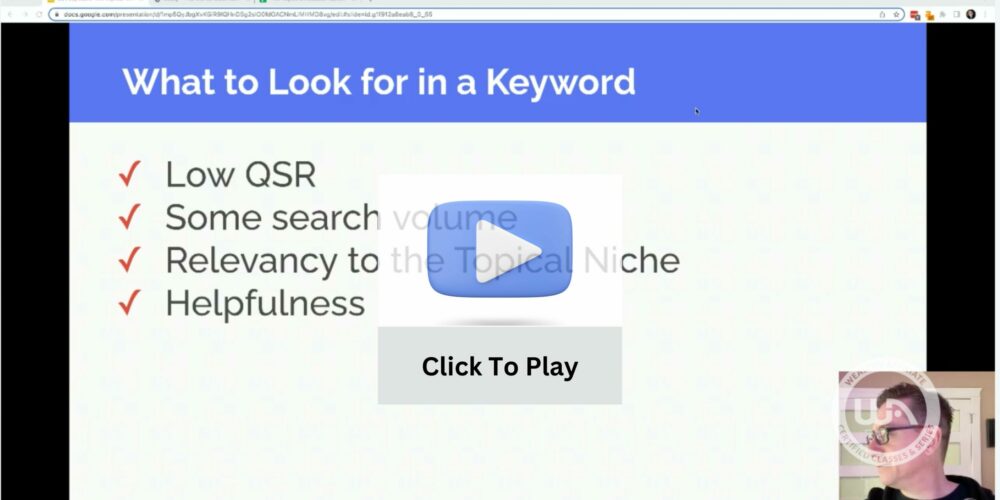As an online business coach, I can’t stress the importance of keyword research enough. So, what are the 3 main factors that go into choosing a keyword?
The three main factors that you need to consider when choosing a keyword are:
- Needs to make grammatical sense: The keyword should fit naturally into sentences and match the user’s search intent.
- High Search Volume: The keyword should be something that people are frequently searching for.
- Low Competition (QSR): The keyword should have less competition, meaning fewer pages are trying to rank for it.
It’s a fundamental pillar in the online world, affecting everything from your website’s visibility to the success of your content marketing strategy.
I want to review topical authority and its relation to keyword research in this article. Let’s clarify some essential topical authority terminology, including keywords and niches.
After that, we’ll dive deep into the three factors when it comes to doing keyword research for a topical niche website.
Note: We may include products or services that will be helpful to our readers. This post may contain affiliate links. For more information, please review the affiliate disclosure page.
- Topical Authority & Keyword Research
- Understanding Keywords & Niches
- The Importance Of Keyword Selection In SEO
- The Golden Rule 1: The Keyword Must Make Grammatical Sense
- The Golden Rule 2: The Keyword Should Have High Search Volume
- The Golden Rule 3: The Keyword Should Have Low Competition
- How To Balance These Factors

What are the 3 main factors that go into choosing a keyword?
The three main factors that you need to consider when choosing a keyword are:
- Grammatical Sense: The keyword should fit naturally into sentences
- High Search Volume: The keyword should be something that people are frequently searching for.
- Low Competition (QSR): The keyword should have less competition, meaning fewer pages are trying to rank for it.
Balancing these three factors is the key to successful keyword selection.
In our journey of keyword exploration, there’s another key player we can’t ignore—topical authority. But what is it, and why does it matter?
Topical authority is a measure of your expertise and credibility within a specific subject area or ‘topic.’
Essentially, it’s about becoming a go-to resource for a particular niche.
When your site has topical authority, search engines recognize it as a reliable source of information on a given subject.
Well, it’s simple. The more authority your website has in a certain topic, the more likely it is that your content will rank higher in search engine results, even for highly competitive keywords.
Achieving topical authority starts with understanding your niche inside and out. Then, you should target relevant keywords that reflect your expertise.
That means creating high-quality, relevant content that meets the needs and interests of your audience consistently.
The key thing to note
Here’s the key: Don’t just aim to rank for random high-volume keywords.
Instead, choose keywords that align closely with your niche and demonstrate your knowledge and authority in this area.
Building topical authority isn’t an overnight task. It’s a strategic, long-term investment that can significantly boost your SEO performance and online visibility.
So, when you’re conducting your keyword research, remember to factor in your topical authority. It could be a game-changer in your SEO strategy.
By establishing your topical authority, you improve your chances of ranking well for your chosen keywords and build trust with your audience.
How do you analyze keywords?
Analyzing keywords involves looking at their relevance to your content, the search volume they generate, and the level of competition or QSR. Various tools like Google’s Keyword Planner, Moz’s Keyword Explorer, and SEMRush can help with this analysis. The goal is to find keywords relevant to your niche, with a high search volume and low competition.
Understanding Keywords and Niches
In the digital marketing sphere, you’ll often hear the terms ‘keywords’ and ‘niches’ used quite liberally.
While they might seem similar, they serve different purposes in your online business strategy.
A keyword is a word or phrase people search for in search engines. Every time you do a Google search, you’re engaging with keywords.
These keywords are the breadcrumbs leading the user to your online content.
A relevant article from notimekillers.com
Read next on “Is Keyword Research Important For A New Blogger? Using Jaaxy” to learn why keyword research is crucial for a new blogger.
A niche, on the other hand, is a specialized segment of the market. Your target audience is the group of people you want to reach with your specific products or services.
Your niche influences your keywords, but they are not one and the same.
For instance, if your niche is ‘vegan skincare,’ your keywords might be ‘vegan face cream,’ ‘cruelty-free skincare,’ and so on.
Now, let’s turn our attention back to keyword research and dig into the golden rules of keyword selection.
The Importance of Keyword Selection in SEO
Search Engine Optimization (SEO) is a bit like a jigsaw puzzle, with each keyword acting as a vital piece.
They guide both the audience and the search engine bots to your content.
That’s why choosing the right keyword is critical—it can make or break your online visibility.

The Golden Rule 1: The Keyword Must Make Grammatical Sense
First off, your keyword needs to make sense grammatically. Yes, it’s as simple as it sounds, yet, often overlooked. In the eyes of search engines, grammar matters.
Let’s say you’re targeting “best coffee shop Chicago”.
While it might yield some traffic, rephrasing it to “best coffee shops in Chicago” sounds more natural and more likely to resonate with your audience.
The Golden Rule 2: The Keyword Should Have High Search Volume
Rule number two – aim for keywords with high search volume. These are phrases people are actively typing into their search bars.
They show demand. But remember, with great search volume often comes great competition.
The trick is finding those “diamond in the rough” keywords—high in volume, low in competition.
The Golden Rule 3: The Keyword Should Have Low Competition (QSR)
In comes our third rule, focusing on competition. QSR or Quoted Search Results represent the number of pages competing for the same keyword.
The lower, the better. Consider tools like Jaaxy to help identify these low-competition keywords.

How do you structure keywords?
Structuring keywords is all about placement and integration. Primary keywords should be included in the title, the first paragraph and then naturally sprinkled throughout the content. Secondary keywords can be used in subheadings and the body of the text. The key is to use the keywords naturally, enhancing the reader’s experience.
How To Balance These Factors: Grammar, Volume, and Competition
Ultimately, the key is finding the balance.
It’s about choosing a keyword that makes grammatical sense, has a high search volume, and boasts low competition.
Yet, remember that this is a delicate dance, and each move depends on your specific needs and objectives.
A relevant article from notimekillers.com
Read next on “Is Niche Research Worthwhile In Digital Marketing? Why It Is“, to learn the basics of niche research in the online world of business.
Final Words
In conclusion, choosing the right keywords is not just about SEO—it’s about understanding your audience and the content they seek.
Ensuring that your keywords make grammatical sense, have a high search volume, and have low competition sets the stage for a successful online presence.
Remember, keyword research isn’t a one-and-done deal. It’s an ongoing process that should grow and evolve with your business.
Happy keyword hunting!
Want to watch an expert class? Looking to learn from the best?
Access to this following class requires a Wealthy Affiliate premium membership, which normally costs $49 per month.
Today, you pay NOTHING if you sign up for a FREE 14-day trial to the premium plus membership- the next tier level membership.
Watch this class for free while having access to all premium plus features for the next 14 days. It’s a great steel, so sign up by clicking on the video below.
Your Turn: How are you doing keyword research?
I would like to get some of your thoughts on this topic. Here’s some food for thought:
- What methods do you use for your keyword research? Are there any tools that you find particularly helpful?
- Can you share an instance where a well-chosen keyword significantly boosted your content’s visibility?
Feel free to share your thoughts by leaving a comment below. I look forward to reading your responses, and I’ll gladly respond promptly.
If you got value from this article, please bookmark this website to visit later for new posts every week. Spread the word to others. Sharing is caring! To get more of this type of content, you won't want to miss out my daily email letters. These are worth some golden nuggets and best tips to help you in your business. Sign up today! Count me in on the daily letters via email! For the latest videos that come out every week, subscribe to the YouTube channel. Also, be sure to check out our new space on Twitter X! YouTube Twitter (X) Medium Profile
Eric is the owner and chief editor of notimekillers.com. He takes great pride in helping people manage their time and grow their businesses. Eric is a firm believer in financial and time freedom, as he believes in financial independence and taking ownership of your time. “Time is your most important asset. It can be your best friend or worst enemy. How you use your time can shape the future you desire to have.” In his leisure time, Eric loves to write and read whenever possible. He enjoys going for long walks outdoors while doing in-home workout videos every week. You can also connect with Eric via LinkedIn.



Hi there, Eric,
I thoroughly enjoyed learning about topical authority and its relationship to keyword research.
You provide an excellent curation of information. Topical authority is a key player in search engine optimization.
I am so glad that I happened upon your article. Great information to help bring my site up in rankings.
Rachele
Hi Rachele!
Topical authority is much more important today in order to stand out from other niche websites.
I think it’s what helps make your niche/brand standout from the rest. Also, it can help with website rankings in Google.
I’m so glad you found this article helpful.
Thanks for sharing your thoughts- they’re much appreciated.